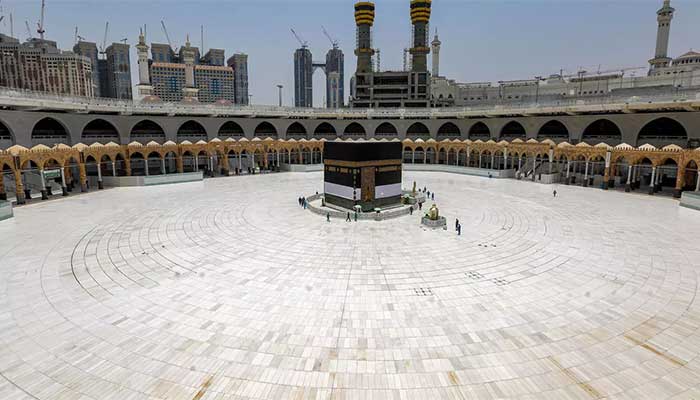
MAKKAH: Saudi Arabia will begin hosting pilgrims for Hajj on Wednesday, on a dramatically reduced pilgrimage due to the coronavirus pandemic that has prevented millions from participating in the ritual for the first time in modern history.
Up to 10,000 people residing in the kingdom will participate in the Muslim ritual, a small fraction of the 2.5 million who attended last year, after what many saw as an opaque selection process that left a wave of rejected applicants.
The foreign press will not be able to participate in this year's Hajj, generally, a major global media event, as the government restricts access to the holy city of Makkah and sets strict health restrictions to prevent a virus outbreak during the pilgrimage of five days, a key pillar of Islam
Saudi Arabia has recorded more than 260,000 cases of the new coronavirus, while the number of declared global infections exceeded 16 million on Sunday.
Pilgrims wearing masks began arriving in Makkah over the weekend and were subjected to temperature checks and quarantined, authorities said.
They were given elaborate amenity kits that include sterilized stones for a stoning ritual, disinfectants, masks, a prayer mat, and ihram, a seamless white garment worn by pilgrims, according to a document from the Hajj ministry program.
Pilgrims must undergo coronavirus testing before arriving in Makkah and must also be quarantined after the pilgrimage.
The ministry said it has established multiple health facilities, mobile clinics, and ambulances to serve pilgrims, who must observe social distancing.
'Golden ticket'
Saudi authorities initially said that only around 1,000 pilgrims residing in the kingdom would be allowed for Hajj, but local media reports say as many as 10,000 will be allowed.
The Hajj ministry has sent an avalanche of anguished Twitter inquiries to rejected applicants.
But Hajj's minister, Mohammad Benten, insisted that the process was transparent, and told Al-Arabiya Saudi television that "determinants of health" formed the basis of the selection.
The ministry said non-Saudi kingdom residents from around 160 countries competed in the online selection process.
He said that foreign residents would constitute 70% of all selected pilgrims.
However, he did not explain how many applied, and some disappointed pilgrims have complained that the government-run lottery was not clearly described and say no reason was given for its rejection.
Among the chosen few is Nasser, a Nigerian expatriate based in Riyadh, elated to win what he called the "golden ticket" for Hajj.
"This feeling cannot be described," he told AFP before his arrival in Mecca.
The ministry has said that Saudi pilgrims were selected from a group of health professionals and military personnel who have recovered from COVID-19.
Being among the elect adds an aura of religious prestige to this year's pilgrimage, applicants say.
Despite the pandemic, many pilgrims consider it safer to participate in this year's ritual without the usual colossal crowds crowding into small religious sites, making it a logistical nightmare and a health hazard.
Even in a normal year, Hajj leaves pilgrims exposed to a number of viral illnesses.
'Substantial cost'
The government has cut pilgrimage as it could be a major source of contagion, but the move will deepen the kingdom's economic slump, analysts say.
It occurs when Saudi Arabia faces a sharp drop in oil prices due to a collapse in global demand fueled by national blockades, triggering austerity measures including the tripling of a value-added tax and cuts in assignments of public officials.
The virus has also mistreated pilgrimage-dependent companies that support hundreds of thousands of jobs in Makkah, from travel agents to street barbers and souvenir shops.
Many have reported radical layoffs, wage cuts, or back wages.
Makkah has seen a construction boom in recent years that added shopping malls, apartments, and luxury hotels, some offering spectacular views of the sacred Kaaba, a cube-shaped structure in the Grand Mosque that Muslims from all over pray to. the world.
But most of the premises have been empty since the pandemic hit the kingdom.
Saudi authorities had already suspended the pilgrimage in March












No comments:
Post a Comment
Thank you for your comment.